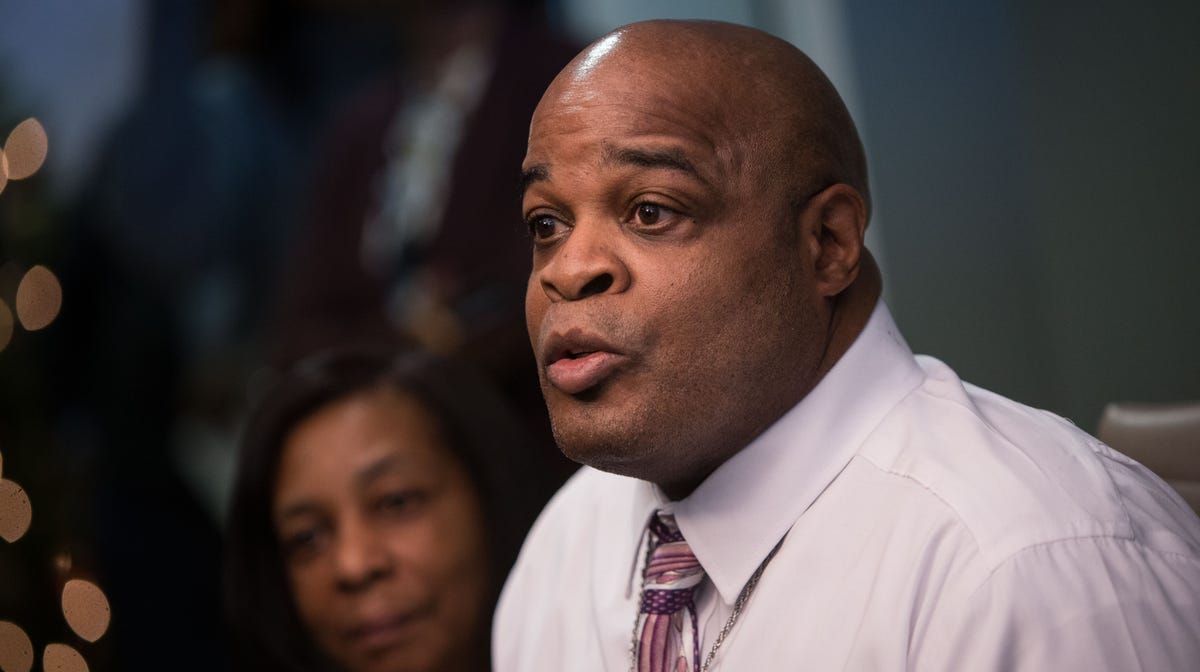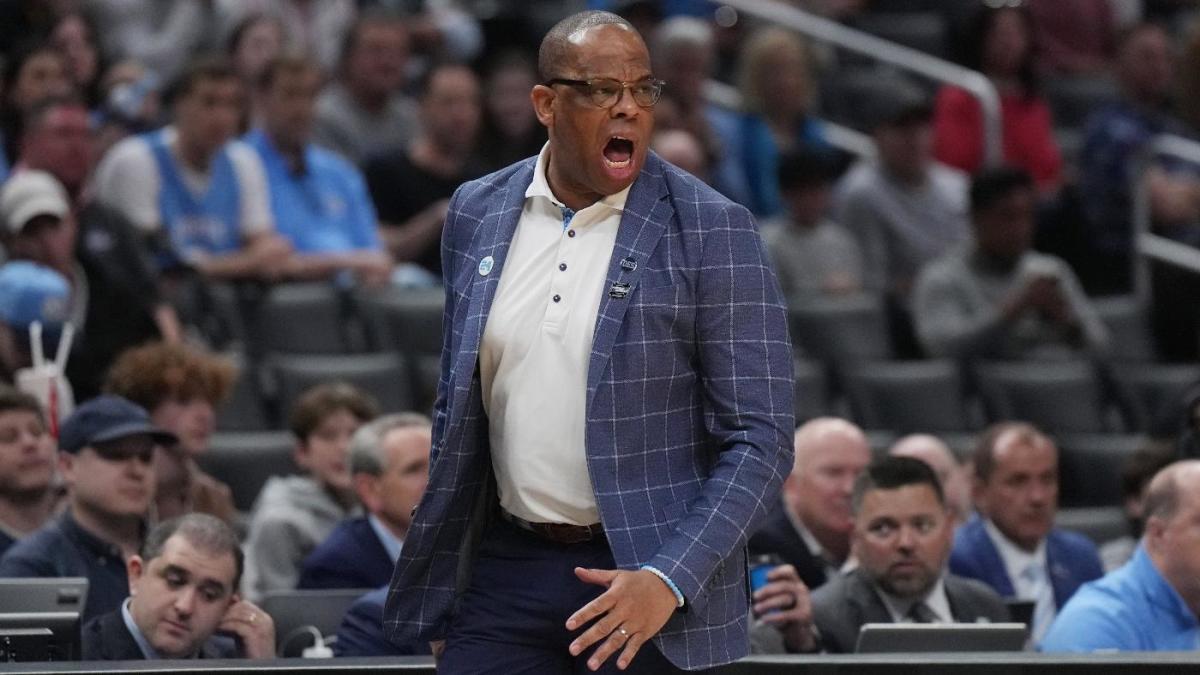California
California’s US Senate candidates agree AI should be regulated — but they differ on why

Artificial intelligence made its way onto the third and final debate of California’s U.S. Senate race Tuesday evening, where the four leading candidates met ahead of the March 5 primary.
All four candidates — Democratic Reps. Adam Schiff of Burbank, Katie Porter of Irvine and Barbara Lee of Oakland as well as Republican ex-Dodger Steve Garvey — concurred that AI should be regulated, but they differed on the reasons why.
AI, “technology that enables computers and digital devices to learn, read, write, talk, see, create, play, analyze, make recommendations and do other things humans do,” according to tech company IBM, has California voters worried this election cycle. Just over five in 10 said they are concerned about their jobs being replaced by AI, according to a December survey by Politico and Morning Consult.
Schiff, during Tuesday’s debate, focused on how AI should be regulated to protect workers. He pointed to the Hollywood strikes over the summer, when Screen Actors Guild-American Federation of Television and Radio Artists and the Writers’ Guild of America members walked out over a number of concerns, including a lack of guardrails against AI taking over writers’ work.
“I was proud to be out there on the picket lines making sure that in these contracts for so many of the workers in the entertainment industry … had protections against AI, potential threat to their jobs,” said Schiff. “We need to also address these changes in the workplace in the light of these new technologies to make sure workers are protected.”
Schiff, when asked in the Register’s Voter Guide questionnaire what he sees as the federal government’s role in creating and enforcing a regulatory framework, said he supports “a high-level agency that is able to act nimbly and put adequate safeguards in place as the technology evolves.”
Lee, who is positioning herself as the more progressive candidate in the race, focused on the nasty side of AI: the potential for the technology to discriminate.
She pointed to studies that have shown how AI can stereotype based on race and gender. Last year, Stable Diffusion, a text-to-image generative AI model created by the startup Stability AI, was found to be amplifying certain stereotypes, like depicting men with lighter skin tones as holding the majority of high-paying jobs, including politicians, lawyers, judges and CEOs, according to Bloomberg. Low-paying jobs, like housekeeper and cashier, however, were depicted as darker-skinned women. A spokesperson for Stability AI told Bloomberg the company is working to develop open-source AI models that are trained to understand different countries and cultures, which they say will “mitigate biases.”
A 2023 study led by the Stanford School of Medicine found that popular chatbots like ChatGPT, GPT-4 and Claude, “appeared to reinforce long-held false beliefs about biological differences between Black and White people,” according to the Associated Press.
“We have to be careful that (artificial intelligence) is not used to discriminate against people because there are some real issues around racial justice that we have to address with AI,” Lee said from the debate stage. “Now’s the time to do it.”
“These are biases that target Black and Brown people,” she said in her Voter Guide questionnaire. “We must work to eliminate the biases within AI algorithms, and that starts by ensuring the way AI is designed and trained is more fair and equitable.”
But Lee also sees positives with AI, saying artificial intelligence can help with the climate crisis, education and healthcare and that a regulatory environment must be developed right away so that the technology can be used for good.
AI tools are already being used in these sectors, by detecting methane and forest fires, locating critical minerals for green technology used in solar panels and electric vehicles, diagnosing and treating illnesses and fostering immersive learning in schools.
Garvey, meanwhile, wants Congress to work with technological innovators, who are mostly based in California to adopt regulations governing the use of AI.
“Because once it starts affecting you and I, and once it starts affecting Californians, that’s when we have to have regulation,” he said.
Like Lee, Garvey said AI has the potential to help with challenges, including in the medical field and climate change.
“However, we must adopt reasonable regulations that ensure the disruption caused by AI is not catastrophic to the livelihoods and security of our residents,” he said in his Voter Guide questionnaire.
And Porter, who sought to position herself during the debate as an outsider unbeholden to special interests, pointed to the “powerful interests that are backing AI” as a reason to regulate the technology, referencing a recent ad from crypto-sponsored super PAC, Fairshake.
While the ad, which accuses Porter of taking money from major banks and pharmaceutical and oil companies, does not mention AI, the Irvine congresswoman alleged that the PAC — major donors to which include venture capital firm AH Capital Management, crypto giant Coinbase and tech company Ripple Labs — is part of the “powerful interests that are backing AI.”
“These are the same handful of ultra-wealthy billionaires who are backing ads that spread false truths about me,” Porter alleged.
In her questionnaire, Porter said: “AI has the potential to be a democratizing force — but it also poses dangerous risks like spreading misinformation online, endangering national security, reinforcing stereotypes and discrimination, automating jobs and more. Washington must take urgent action to protect against these potential risks — not slow walk until it’s too late to take meaningful action.”
While only Garvey, Lee, Porter and Schiff have participated in the three debates held thus far, there are more than 20 other candidates on the primary ballot for the U.S. Senate race, including Republican attorney Eric Early and former local TV journalist Christina Pascucci, a Democrat.
On AI, Early said that while he believes in small government, “the threat of AI run amok is so severe” that the federal government must actively regulate the industry.
Pascucci, too, called for regulation, saying her career as a journalist taught her “the value of truth and the danger of disinformation.” Like Garvey, Pascucci said while AI may cure cancer one day, it poses challenges and risks. Innovators in California’s Silicon Valley should be tapped to push forward the regulation of AI technology, she said.
Mark Ruzon, a software engineer who resides in Mountain View, said an area of particular concern is the use of AI in weapons.
“We should work with the nations of the world to outlaw weapons that use AI to attack civilians indiscriminately or to assassinate specific individuals,” he said.

California
California to use generative AI to improve services, cut traffic jams
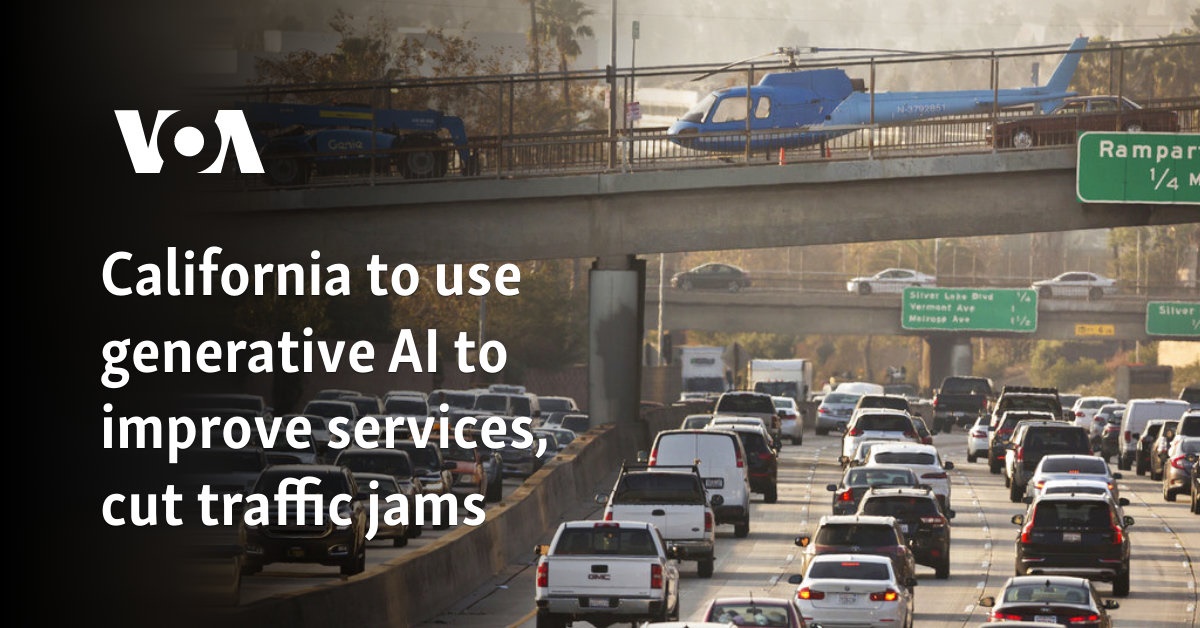
California could soon deploy generative artificial intelligence tools to help reduce traffic jams, make roads safer and provide tax guidance, among other things, under new agreements announced Thursday as part of Governor Gavin Newsom’s efforts to harness the power of new technologies for public services.
The state is partnering with five companies to create generative AI tools using technologies developed by tech giants such as Microsoft-backed OpenAI and Google- and Amazon-backed Anthropic that would ultimately help the state provide better services to the public, administration officials said.
“It is a very good sign that a lot of these companies are putting their focus on using GenAI for governmental service delivery,” said Amy Tong, secretary of government operations for California.
The companies will start a six-month internal trial in which state workers test and evaluate the tools. The companies will be paid $1 for their proposals. The state, which faces a significant budget deficit, can then reassess whether any tools could be fully implemented under new contracts. All the tools are considered low risk, meaning they don’t interact with confidential data or personal information, an administration spokesperson said.
Newsom, a Democrat, touts California as a global hub for AI technology, noting 35 of the world’s top 50 AI companies are located in the state. He signed an executive order last year requiring the state to start exploring responsible ways to incorporate generative AI by this summer, with a goal of positioning California as an AI leader.
In January, the state started asking technology companies to come up with generative AI tools for public services. Last month, California was one of the first states to roll out guidelines on when and how state agencies could buy such tools.
Generative AI, a branch of AI that can create new content such as text, audio and photos, has significant potential to help government agencies become more efficient, but there’s also an urgent need for safeguards to limit risks, state officials and experts said. In New York City, an AI-powered chatbot created by the city to help small businesses was found to dole out false guidance and advise companies to violate the law. The rapidly growing technology has also raised concerns about job losses, misinformation, privacy and automation bias.
While state governments are struggling to regulate AI in the private sector, many are exploring how public agencies can leverage the powerful technology for public good. California’s approach, which also requires companies to disclose what large language models they use to develop AI tools, is meant to build public trust, officials said.
The state’s testing of the tools and collecting of feedback from state workers are some of the best practices to limit potential risks, said Meredith Lee, chief technical adviser for the University of California-Berkeley’s College of Computing, Data Science and Society. The challenge is determining how to assure continued testing and learning about the tools’ potential risks after deployment.
“This is not something where you just work on testing for some small amount of time and that’s it,” Lee said. “Putting in the structures for people to be able to revisit and better understand the deployments further down the line is really crucial.”
The California Department of Transportation is looking for tools that would analyze traffic data and come up with solutions to reduce highway traffic and make roads safer. The state’s Department of Tax and Fee Administration, which administers more than 40 programs, wants an AI tool to help its call center cut wait times and call length. The state is also seeking technologies to provide non-English speakers information about health and social services benefits in their languages and to streamline the inspection process for health care facilities.
The tools are to be designed to assist state workers, not replace them, said Nick Maduros, director of the Department of Tax and Fee Administration.
Call center workers there took more than 660,000 calls last year. The state envisions the AI technology listening along to those calls and pulling up specific tax code information associated with the problems callers describe. Workers could decide whether to use the information.
Currently, call center workers have to simultaneously listen to the call and manually look up the code, Maduros said.
“If it turns out it doesn’t serve the public better, then we’re out $1,” Maduros said. “And I think that’s a pretty good deal for the citizens of California.”
Tong wouldn’t say when a successfully vetted tool would be deployed, but added that the state was moving as fast as it can.
“The whole essence of using GenAI is it doesn’t take years,” Tong said. “GenAI doesn’t wait for you.”
California
Artful rebellion: California man thwarts city officials with boat mural

Sunday, May 12, 2024 2:03AM
A California man was told by city officials he needed to up a fence to hide his boat from public view. The man did just that, but with a twist.
SEASIDE, Calif. — A California man was told by the city of Seaside he needed to put up a fence to hide his boat from public view. That’s exactly what he did, but with a twist.
The man had a friend, who is an artist, paint a realistic picture of his boat on the six-foot-tall fence.
Instead of seeing a boat in the man’s yard, you now see a large mural of the boat on the fence.
The boat owner said he is happy with how the mural turned out, and perhaps he got the last laugh.
The internet appears to love his stoke of genius, too, since the mural has gone viral.
Copyright © 2024 KABC Television, LLC. All rights reserved.
California
Lakers News: Schedule, Location Determined for LA in California Classic
The timing and locale for the Los Angeles Lakers’ participation in this year’s impending California Classic Summer League have been revealed.
Per Jason Anderson of The Sacramento Bee, the Sacramento Kings and Golden State Warriors are set to co-host the event this year. The California Classic happens ahead of the bigger Las Vegas Summer League.
12 total contests will be played between July 6-10, all told. Three of the four California teams will attend (the L.A. Clippers will sit out). The Lakers, Warriors and Kings will be joined by the Charlotte Hornets, San Antonio Spurs, and Miami Heat. The Warriors, Lakers and Heat are all scheduled to suit up in San Francisco, while the other clubs will play in Sacramento, before a Warriors-Kings game in San Francisco concludes the festivities.
Last year, Los Angeles selected former Indiana Hoosiers point guard Jalen Hood-Schifino with the No. 17 pick in the draft, plus ex-Pepperdine forward Maxwell Lewis with the No. 40 pick. Neither contributed meaningfully to the club’s win-now roster. This season, L.A. possesses the No. 17 selection once again, plus the No. 55 pick in the second round.
More Lakers: LA Reportedly To Interview Coach Still in Postseason For HC Gig
-

 News1 week ago
News1 week agoSome Florida boaters seen on video dumping trash into ocean have been identified, officials say
-

 Education1 week ago
Education1 week agoVideo: President Biden Addresses Campus Protests
-

 World1 week ago
World1 week agoUN, EU, US urge Georgia to halt ‘foreign agents’ bill as protests grow
-

 World1 week ago
World1 week agoEuropean elections: What do voters want? What have candidates pledged?
-
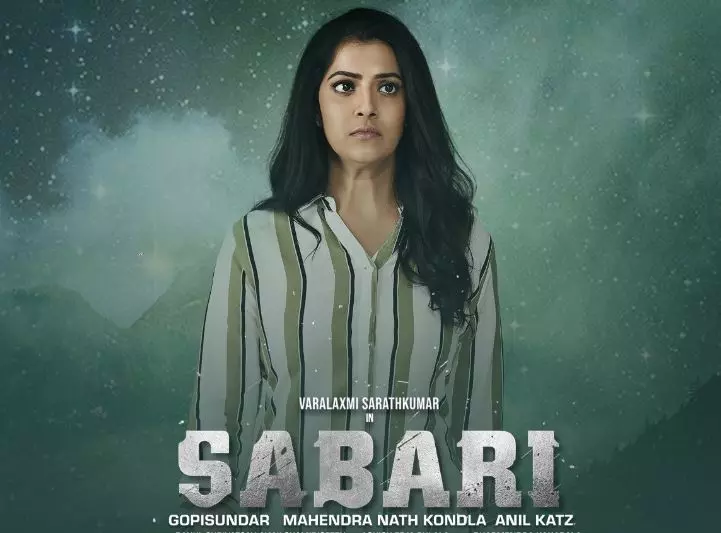
 Movie Reviews1 week ago
Movie Reviews1 week agoSabari Movie Review: Varalaxmi Proves She Can Do Female Centric Roles
-

 Politics1 week ago
Politics1 week agoAustralian lawmakers send letter urging Biden to drop case against Julian Assange on World Press Freedom Day
-

 News1 week ago
News1 week agoWhistleblower Joshua Dean, who raised concerns about Boeing jets, dies at 45
-

 World1 week ago
World1 week agoBrussels, my love? Champage cracked open to celebrate the Big Bang
